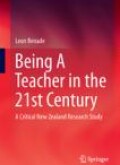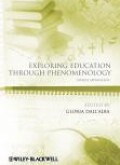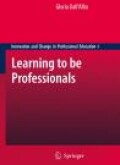News
PESA does not sell or take commission from any of the events listed on this website.
 | Benade, Leon, Being a teacher in the 21st century: A critical New Zealand research study, (Springer: Singapore) 2017This book provides scholars, teacher educators, as well as reflective school leaders and teachers with valuable insights into what it is to be a teacher in the 21st century. It does so by presenting original research based on a study of several New Zealand schools between 2013 and 2015, and in particular, a focussed study of four of those schools in 2015. |
 | Dall'Alba, Gloria, Exploring education through phenomenology: Diverse approaches, (Wiley-Blackwell: Oxford) 2009Increasing interest in phenomenology as a philosophy and research movement among scholars in education, the humanities and social sciences makes this book both timely and relevant for educational debate. The book explores contributions of phenomenology to educational practice and research. It juxtaposes diverse approaches to phenomenological inquiry in addressing questions of significance for education today. It thereby demonstrates phenomenology is a contemporary movement that is both dynamic and varied. The book highlights ways in which phenomenology can inform a broad range of aspects of educational theorising and practice, including learning through the body, writing online, being an authentic teacher, ambiguities in becoming professionals, and school transition. Through exploring and interrogating diverse approaches and ideas from phenomenology, this book provides insights into key educational questions. http://au.wiley.com/WileyCDA/WileyTitle/productCd-1405196599.html |
 | Dall'Alba, Gloria, Learning to be professionals, (Springer: Dordrecht) 2009Preparing professionals to meet the demands of changes in practice is a compelling issue for the development of society, professions and individual professionals. A key tenet of this book is that we currently prepare professionals for the world of work in ways that are generally limited in scope and inadequate for addressing contemporary professional practice. The book critically investigates professional education programmes and the assumptions upon which they are based, closely interweaving theory and empirical material on learning to be professionals. It argues for an ontological turn in which professional education attends not only to what students know and can do, but also who they are becoming as professionals. |
 | Lam, Chi-Ming & Park, Jae, Sociological and Philosophical Perspectives on Education in the Asia-Pacific Region, (Springer: Singapore) 2016This book demonstrates the value of approaching education from a sociological and philosophical perspective. Specifically, it addresses current and long-standing educational issues in the Asia-Pacific region, integrating sociological and philosophical insights with practical applications in four key areas: educational aims, moral education, educational policy, and the East-West dichotomy. It discusses educational aims in terms of rationality, philosophical thinking, and sustainable development and presents the literary, religious, and analytical approaches to moral education. Four educational policies are then considered: Hong Kong’s language policy, Hong Kong’s policy on the internationalization of education, East Asia’s policies on English education, and Australia’s policy on teacher education. Different aspects of the East-West dichotomy are analysed: Confucian rationalism versus Western rationalism, Confucian learning culture versus Western learning culture, and Asian research methodology versus Western research methodology. Taken as a whole, the book shows that issues in education are rarely simple, and looking at them from multiple perspectives allows for rich and informed debates. It presents a rare philosophical and sociological analysis of the cultures and experiences of education in the Asia-Pacific region, and promotes research that leads to more culturally rooted educational policies and practice. |
 | White, E. Jayne, Introducing dialogic pedagogy: Provocations for the early years, (Routledge) 2016Translating the growing body of dialogic scholarship into a practical application of teaching and learning with very young children, this book provides readers with significant provocations concerning ethical self-other relations, creativity and agency. Investigating dialogic philosophy through the writings of Mikhail Bakhtin and associates, applications to early childhood education are presented, with an emphasis on notions of justice, democracy, ethics and answerability. This book provides unique insights into the amazing world of the youngest child, offering enriched understandings of the profound impact of adults in their journey of becoming. |
 | Rule, Peter, Dialogue and Boundary Learning, (Sense Publishers: Rotterdam) 2015In an increasingly monologic world of war, exploitation and fear of “the other”, dialogue within and between humans, and with the world around us, is critical to a humane future. |
 | Quay, John, Understanding life in school: From academic classroom to outdoor education, (Palgrave Macmillan: London) 2015We've all been to school, so what could be simpler than understanding life in school? The problem is that we take school for granted, accepting it for what it is without asking too many questions. This leaves us tinkering around the edges when it comes to school reform. A deeper understanding of life in school is required, which this book seeks to offer by going to the source of the matter itself – the young people who are in the midst of the day-to-day routines of school life. Much is revealed by contrasting their experiences in academic classrooms and school camp, insights that remain invisible without this juxtaposition. Key to analysis of these experiences is an understanding of life as occupational, constituted through many and various ways of being. This highlights the importance to teaching and learning of addressing the issue of who we are, not just what we know. |
 | Peters, Michael A., Paraskeva, João M., & Besley, Tina (A.C.), The Global Financial Crisis & Educational Restructuring, (Peter Lang: New York) 2015The worldwide integration and globalization of finance, an aspect of «financialization», coincided with the rise of market-oriented neoliberalism promoting free trade and privatization strategies. New Internet-based technologies have reinforced financial market integration, creating a fragile, globally integrated financial ecosystem that poses new systemic risks and contagion effects characterized by excessive borrowing and ballooning debt, massive asset bubbles, a huge shadow banking system, and financial innovation leading to collateralized debt obligation and securitization. Public education has been at the core of neoliberal privatization strategies and financialization with the trillion-dollar blowout of student loans. Education, once considered a national and global public good tied to the creation of knowledge and the basis of a just and democratic society, has undergone a profound transformation and financial restructuring. This collection of essays by a range of international experts addresses the root causes of this massive change, analyzing the growth of finance capitalism and financialization, as well as the financialization of education and its consequences. The book is a valuable resource for classes in educational reform, education policy, higher education, and educational finance. w.amazon.com/Financial-Educational-Restructuring-Studies-Education/dp/1433125390 |
 | Peters, Michael A., & Besley, Tina (A.C.), Paulo Freire: The Global Legacy, (Peter Lang: New York) 2015This collection is the first book devoted to Paulo Freire’s ongoing global legacy to provide an analysis of the continuing relevance and http://www.peterlang.com/download/datasheet/82406/datasheet_312532.pdf http://www.amazon.com/Paulo-Freire-Global-Legacy-Counterpoints/dp/1433125315 |
 | Dr Si Belkacem TAIEB, Decolonizing Indigenous Education: An Amazigh-Berber Ethnographic journey, (Palgrave MacMillan: New York) 2014In this work exploring the Kabyle people of Algeria and their educational journeys, Si Belkacem Taieb explores an epistemological and ontological framework for Kabyle education. He does so by undertaking a narrative inquiry: an auto-ethnographic journey, in which the journey of one's self and the journey of one's people are inextricably intertwined.In a postcolonial cultural journey in an indigenous, North African Kabyle landscape and the development of an Amazigh educational philosophy, Taieb writes the sociological foundations of an Amazigh educational system: one that removes Amazigh education from its colonial heritage and restores it to the people who create and use it. |
 | Jackson, Liz, Muslims and Islam in U.S. Education: Reconsidering Multiculturalism, (Routledge) 2014Muslims and Islam in U.S. Education explores the complex interface that exists between the U.S. school curriculum, teaching practice about religion in public schools, societal and teacher attitudes toward Islam and Muslims, and multiculturalism as a framework for meeting the needs of minority group students. It presents multiculturalism as a concept that needs to be rethought and reformulated in the interest of creating a more democratic, inclusive, and informed society. http://www.routledge.com/books/details/9780415705042/ http://www.amazon.com/Muslims-Islam-U-S-Education-Multiculturalism/dp/0415705045 |
 | Freakley, Mark; Burgh, Gilbert, Mark Freakley & Tilt MacSporran, Lyne, Values Education in Schools: A resource book for student inquiry, (ACER Press: Camberwell, Victoria) 2008Values Education in Schools is an important new resource for teachers involved in values and ethics education. It provides a range of ‘practical philosophy’ resources for secondary school teachers that can be used in English, religious education, citizenship, personal development and social science subjects. The materials include narratives to engage students in philosophical inquiry, doing ethics through the activity of philosophy, not simply learning about it. |
